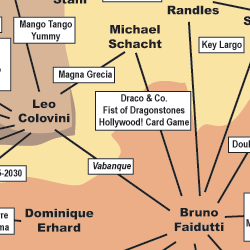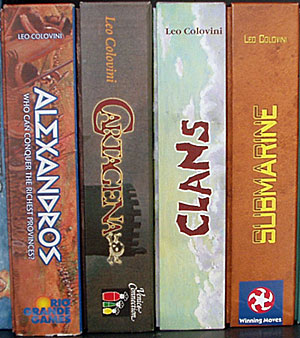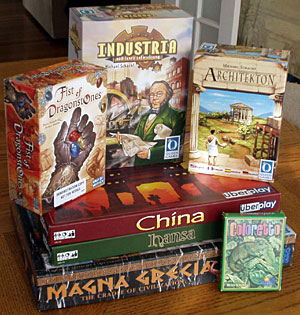 Back in December I wrote an article on three game designers, and I'll cop to lining up the usual suspects: Knizia, Kramer, and Teuber. They were easy to write about because I've played a slew of their games and I've played them many times.
Back in December I wrote an article on three game designers, and I'll cop to lining up the usual suspects: Knizia, Kramer, and Teuber. They were easy to write about because I've played a slew of their games and I've played them many times.I always intended that article to be the start of a series, however, and I was even more excited about writing about designers who weren't quite as well known as the big three, because they've been less written about, and thus there's more opportunity to be clever, insightful, and original.
This week I've decided to write about three collaborative designers, who also happen to come from three different countries: Bruno Faidutti (France), Leo Colovini (Italy), and Michael Schacht (Germany). They also all appear pretty centrally on my Six Degrees of Collaboration chart, with Colovini & Faidutti being two of the larger foci in the chart. (Writing this article was actually what got me started on that chart, which then took on a life of its own.)
#1: Bruno Faidutti
 Bruno Faidutti is familiar to many online gamers because he's a net.personality. His web site is entirely delightful. The ideal game library is nice enough, and when he's written something about a game I want to learn more about, I'll usually read it. However, it's his pages on his own games that I find particularly enjoyable. I especially enjoy his "histories", which talk about the development of his games.
Bruno Faidutti is familiar to many online gamers because he's a net.personality. His web site is entirely delightful. The ideal game library is nice enough, and when he's written something about a game I want to learn more about, I'll usually read it. However, it's his pages on his own games that I find particularly enjoyable. I especially enjoy his "histories", which talk about the development of his games.Faidutti has gotten a reputation as being "the chaotic designer". There's definitely a lot of chaos in his games: usually cards or tiles that turn a game upside down. However, as I wrote in my article on Schools of Game Design, I think that's a pretty strong element of French design in general. It's just Faidutti who happens to get tagged with this label because he's one of the most prominent French designers. I've seen some people who have entirely blasted Faidutti's games for their high chaos. Democrazy in particular is a game that seems to have come across badly to a lot of people. To which I'd say: get over it. Chaos is implicit in his games, and you should know that going in. (As an aside: Faidutti says that not all of his games are chaotic, but the non-chaotic examples that he offers, Babylone and China Moon, haven't been printed in the United States.)
My first instinct is to call Faidutti's games light; either in game-length or mechanic-weight they don't usually feel like they can sustain a night of gaming on their own. However, that's largely because so many of his designs are card games. Mystery of the Abbey and Iglu Iglu are both fine full-length games, while from what I've heard Valley of the Mammoths is if anything too long. Currently Bruno seems to be turning toward more big-box games, with Key Largo, Mission: Red Planet, and Silk Road all on the horizon, as well as the new Warrior Knights, which he had a hand in. But for now I'll stay with my statement of "light", as I can't really tell how heavy his upcoming games are.
Despite most of his games being card-based, Bruno does stretch the medium quite a bit. He's done quite a few auction card games, including Boomtown (which has simple, open auctions), Queen's Necklace (including a turn-based auction), and Fist of Dragonstones and Corruption (each of which has unique blind bids where everyone loses what they bid). Bruno's classic Citadels is essentially a resource-management game played with cards, while Democrazy is voting, Dragon's Gold is negotiation, and Knock! Knock! is bluff. Terra and The Hollywood! Card Game have more common, set-collection mechanisms, but that's a rarity among Bruno's designs.
As you might have guessed from last week's graph, Bruno's designs are usually collaborations. Despite that I personally think he's done his best design work on his own (Citadels, Corruption, Democrazy, and the very-interesting-though-not-a-good-game Terra), but some of his collaborations are strong as well. I enjoy his Serge Laget designs (Castle, Mystery of the Abbey) and his works with Michael Schacht (Fist of Dragonstones, The Hollywood! Card Game) the most.
My Reviews: Boomtown (B+), Castle (B), Citadels (A-), Corruption (B-), Democrazy (C), Fist of Dragonstones (B-), The Hollywood! Card Game (B), Iglu Iglu (B), Mystery of the Abbey (B-), Queen's Necklace (B-), Terra (B-).
Interviews: About.com (2000), Fairplay Games (2002), Interviews by an Optimist (2005)
Web Site: www.faidutti.com, Forums (French)
#2: Leo Colovini
 Leo Colovini doesn't necessarily get a lot of press. For whatever reason, his games don't make big waves, and you'll rarely find them on any top ten upcoming lists for Essen or Nurnburg (though actually, his upcoming game, Masons, almost made my Nurnberg list last week because it looks neat). Nonetheless, he pretty consistently publishes games, and a lot of them get some pretty consistent play. Clans is one that I use as a very regular filler.
Leo Colovini doesn't necessarily get a lot of press. For whatever reason, his games don't make big waves, and you'll rarely find them on any top ten upcoming lists for Essen or Nurnburg (though actually, his upcoming game, Masons, almost made my Nurnberg list last week because it looks neat). Nonetheless, he pretty consistently publishes games, and a lot of them get some pretty consistent play. Clans is one that I use as a very regular filler.Overall I'd call Colovini "the quiet designer". This isn't due to his personal nature (though perhaps he's quiet; I don't know), but rather the tenor of his games. I can frequently tell when a Colovini game is being played because an unnatural, deathly quiet falls upon the group, as they study their best moves and take them, all with no verbal interaction. I expect some people don't like the lack of conversation that his games seems to invoke, but at the same time it bespeaks the depth of analysis that his games allow. Related to all this, Colovini's games are very dry and abstract. Personally, I'd say moreso than anything that Reiner Knizia does, and I generally think that he's more "German" than most German designers.
Overall, Colovini's games fall into a strange category that I call the "serious filler". Most of his popular games play in 30-45 minutes, and they tend to depend upon just one or two mechanisms. In addition, there's not a lot of luck in the games, and there is a lot of ability to plan serious strategies, or else make brilliant tactical moves. Alexandros, The Bridges of Shangrila, Cartagena, Clans, Go West! , and Submarine all fit right into this category for me. (That's actually caused me some problems with The Bridges of Shangrila because of its large box size. I don't want to expend that much space in my game bag for something that's really a filler!)
Magna Grecia and Inkognito are exceptions to this general pattern of producing filler-length games. They're both longer and I'd feel more comfortable making them the focus of a game night--but they're also both collaborations (with Michael Schacht and Alex Randolph, respectively). Carolus Magnus, Colovini's dynamic majority-control game, skirts this line too, and it's one he designed on his own.
I've noted a particular game mechanism that's shown up in a few Colovini games: player-triggered scoring. In both Alexandros and Go West! players can take an action to trigger scoring for everyone, with the idea that you'll do so when you're in the lead. Thus far I've found it a very tenuous mechanic that I think puts too much weight on the players' shoulders. It's OK in Alexandros, but just barely works in Go West! It also seems to get shakier the more players you have in the game.
I've played quite a few more Colovini games than I've reviewed, but have given my best ratings of everything I'm pretty familiar with.
My Reviews: Alexandros (B), The Bridges of Shangrila (B+), Carolus Magnus (B), Cartagena (B-), Clans (A-) , Corsari (C-), Go West! (C+), Magna Grecia (B), Submarine (D+)
Interviews: BoardGameNews (2006)
#3: Michael Schacht
 Completing our survey of European designers we come to Michael Schacht in Germany. He's produced pretty huge numbers of games, but less than a dozen that have gotten any amount of attention in the United States. That's partially because many of his games are independently published by his own company, Spieles aus Timbuktu, and thus never make it to this side of the Atlantic. I suspect Uberplay's recent copublications of a few Schacht Abacus Spiele games and Rio Grande's recent picking up of the Queen line are going to start increasing his profile here.
Completing our survey of European designers we come to Michael Schacht in Germany. He's produced pretty huge numbers of games, but less than a dozen that have gotten any amount of attention in the United States. That's partially because many of his games are independently published by his own company, Spieles aus Timbuktu, and thus never make it to this side of the Atlantic. I suspect Uberplay's recent copublications of a few Schacht Abacus Spiele games and Rio Grande's recent picking up of the Queen line are going to start increasing his profile here.I'd generally call Schacht the "connections designer", because he has a strange obsession with connectivity in his games. It's an interesting mechanic that's of course the heart of many railroad games, but which Schacht uses a lot more widely. So you have China's connected road scoring and the similar scoring in Architekton. You have valuable connected resources that you can buy in Industria and a directed graph at the heart of Hansa. Magna Grecia (codesigned with Colovini) is entirely about the valuations created by connections. I suspect you could use graph theory to figure out strategies in a lot of Schacht's games, and I've heard some comments that Paris Paris, another network-centered game, may indeed be solvable in that manner.
One major element of Schacht's output seems to be very light card games. The well-received Coloretto is a simple set-collection game, as is the more recent Hollywood! Card Game (with Bruno Faidutti). Richeliu (which is actually related to Web of Power), Station Manager, and Coloretto Amazonas (which isn't actually related to Coloretto at all) are more set-collection games, while Hispaniola is trick-taking.
Moving on to board games, Schacht put together short to medium-length boardgames, running about an hour, which nonetheless have a fair amount of good strategic complexity. It's somewhat similar to Colovini's output, but a little longer and a little less serious (as odd as that might sound). Some of Schacht's great time-to-strategy ratio probably comes from his emphasis on very simple systems that still have a lot of depth (much as with Knizia's designs).
The mechanics of Schacht's games cover a what's what of German game design, so we find tile-laying (Kontor, Isis & Osiris), majority-control (Web of Power, rethemed as China), auction (Fist of Dragonstones, Industria, Don, Mogul), and trading (Dscunke). Like Wolfgang Kramer, he really seems to enjoy covering a lot of ground.
Again, I've given my guesses at a few Schachts that I've played but not yet reviewed. Schacht is a designer that I'm likely to revisit when more of his games end up in wider distribution in the United States.
My Reviews: Architekton (C), China (A), Coloretto (A), Fist of Dragonstones (B-), Hansa (A-), The Hollywood! Card Game (B), Industria (B+), Magna Grecia (B+)
Interviews: About.com on Web of Power (2001), Gamefest (2004), Interviews by an Optimist (2005)
Web Sites: Spiele aus Timbuktu (w/connection-based navigation)
5 comments:
For a Colovini title that doesn't qualify as "serious filler", check out Familienbande. Fairly light filler about marrying off people so their descendants can carry on the genetic trait you favor. I enjoy it. It's the only Colovini I own.
Looking at the pics of Michael Schacht's games and knowing Mary's recommendations I was really suprised not to see Trias there ;-)
I know what you mean Grog. I played Barbarossa with a bunch of people including an old wargaming buddy and we found the lack of Panzers and T-34s to be quite confusing!
Wow! Great article! Fascinating read.
I think Democrazy should count as a collaboration, since it's essentially a redevelopment of Karl-Heinz Schmiel's "Das Regeln Wir Schon".
A good point.
Post a Comment